238. Product of Array Except Self
Description
Given an integer array nums, return an array answer such that answer[i] is equal to the product of all the elements of nums except nums[i].
The product of any prefix or suffix of nums is guaranteed to fit in a 32-bit integer.
You must write an algorithm that runs in O(n) time and without using the division operation.
Examples
- Example 1:
- Input:
[1,2,3,4] - Output:
[24,12,8,6]
- Input:
- Example 2:
- Input:
[-1,1,0,-3,3] - Output:
[0,0,9,0,0]
- Input:
Constraints
- 2 <=
nums.length<= 105 -30 <= nums[i] <= 30- The input is generated such that
answer[i]is guaranteed to fit in a 32-bit integer.
Follow up: Can you solve the problem in
O(1)extra space complexity? (The output array does not count as extra space for space complexity analysis.)
Test
#[cfg(test)]mod tests { use super::*;
#[test] fn test_example1() { let nums = vec![1, 2, 3, 4]; let result = product_except_self(nums); let expected = vec![24, 12, 8, 6]; assert_eq!(result, expected); }
#[test] fn test_example2() { let nums = vec![-1, 1, 0, -3, 3]; let result = product_except_self(nums); let expected = vec![0, 0, 9, 0, 0]; assert_eq!(result, expected); }
#[test] fn test_all_positive() { let nums = vec![2, 3, 4, 5]; let result = product_except_self(nums); // For nums = [2, 3, 4, 5]: // Total product = 2 * 3 * 4 * 5 = 120 // Expected = [120/2, 120/3, 120/4, 120/5] = [60, 40, 30, 24] let expected = vec![60, 40, 30, 24]; assert_eq!(result, expected); }
#[test] fn test_with_negative_numbers() { let nums = vec![1, -2, 3, -4]; let result = product_except_self(nums); // For nums = [1, -2, 3, -4]: // Expected product array = [(-2*3*-4), (1*3*-4), (1*-2*-4), (1*-2*3)] = [24, -12, 8, -6] let expected = vec![24, -12, 8, -6]; assert_eq!(result, expected); }
#[test] fn test_with_zeros() { let nums = vec![0, 4, 0, 5]; let result = product_except_self(nums); // For nums = [0, 4, 0, 5]: // Multiple zeros in the array result in all zeros. let expected = vec![0, 0, 0, 0]; assert_eq!(result, expected); }}Prototype
pub fn product_except_self(nums: Vec<i32>) -> Vec<i32> { todo!()}Solutions
Brute Force
I like to start solving problems with brute force solutions when possible, even if I end up with Time Limit Exceeded. It helps me understand the problem much better.
Actually, everything here is quite simple—there’s nothing complicated to explain. We iterate over the entire array every time and calculate the product for each number except itself. Notice that we recalculate everything repeatedly, which suggests that there is a way to pre-calculate parts of the computation.
pub fn product_except_self(nums: Vec<i32>) -> Vec<i32> { let mut res = Vec::with_capacity(nums.len());
for i in 0..nums.len() { let mut product = 1; for (y, &n) in nums.iter().enumerate() { if y != i { product *= n } } res.push(product) } res}- Time Complexity: O(n²)
- Space Complexity: O(1) - answer isn’t included to calculate the final space complexity.
Division
The first way we can pre-calculate everything is the most obvious one—multiply all the numbers together and then divide that product by each number to find the result. Although this approach is forbidden by the problem description, it serves as a good educational example to understand how it works. There are two edge cases to consider, both related to division by zero, but let’s examine it step by step.
Division with no edge cases handled
Let’s consider, for example, nums = vec![1, 2, 3, 4].
- First, we calculate the product of the entire array, which is 24.
- Then, we iterate one more time and divide the product by each number, so
[24/1, 24/2, 24/3, 24/4]becomes[24, 12, 8, 6].
// Note that this is not the final solution.pub fn product_except_self(nums: Vec<i32>) -> Vec<i32> { let product: i32 = nums.iter().product(); nums.iter().map(|&v| product / v).collect()}Edge Case 1: Multiple Zeros
When there are multiple zeros in the nums array, every product will be 0 because multiplying any number by 0 results in 0. Therefore, in this case, we can immediately return an array of zeros.
Let’s consider, for example, nums = vec![0, 1, 2, 3, 4, 0].
// Note that this is not the final solution.pub fn product_except_self(nums: Vec<i32>) -> Vec<i32> { let mut zeros_count = 0; let mut product = 1;
for (i, &num) in nums.iter().enumerate() { if num == 0 { zeros_count += 1 } else { product *= num } }
match zeros_count { 2.. => vec![0; nums.len()], _ => nums.iter().map(|&v| product / v).collect(), }}Edge Case 2: One Zero
When there is exactly one 0 in the nums array, the product for every element (except the 0 itself) will be 0 because multiplying any number by 0 yields 0. The only exception is the element that is 0—its product will be the product of all non-zero numbers. Therefore, we can directly return an array of zeros with the computed product placed at the index corresponding to the single zero.
// Final solutionpub fn product_except_self(nums: Vec<i32>) -> Vec<i32> { let (mut zero_idx, mut zeros_count) = (0, 0); let mut product = 1;
for (i, &num) in nums.iter().enumerate() { if num == 0 { zero_idx = i; zeros_count += 1 } else { product *= num } }
match zeros_count { 1 => { let mut res = vec![0; nums.len()]; res[zero_idx] = product; res } 2.. => vec![0; nums.len()], _ => nums.iter().map(|&v| product / v).collect(), }}Prefix and Suffix
Approach
Since we can’t use division, we need another approach to pre-calculate the product. A good method is to use two additional vectors:
- Prefix: This vector stores the product of all numbers before each index.
- Suffix: This vector stores the product of all numbers after each index.
Let’s take, for example, nums = [1, 2, 3, 4]:
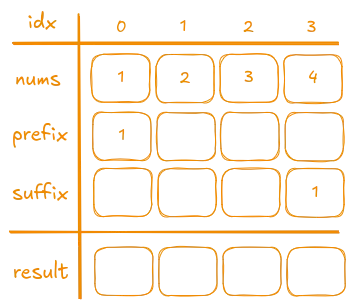
Since there are no numbers before the first element and after the last element of nums, the first element in the prefix vector and the last element in the suffix vector are always set to 1.
Iteration on Prefix
The iteration to pre-calculate all products for the prefix vector starts at index 1 because we already know that the product of all numbers before nums[0] is 1.
To compute the product for all numbers before nums[i], we:
- Take the product stored in
prefix[i - 1](which represents the product of all numbers beforenums[i - 1]). - Multiply it by
nums[i - 1]. - Store the result in
prefix[i].
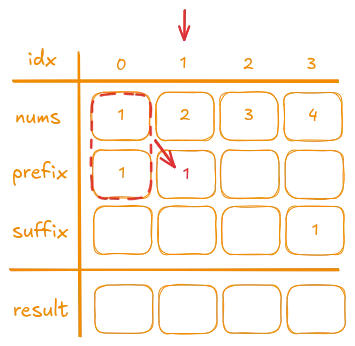
For example, during the second iteration (at index 2):
- The previous number (
nums[1]) is2. - The product stored in
prefix[1]is1. - We multiply them:
1 * 2 = 2. - We then store
2inprefix[2].
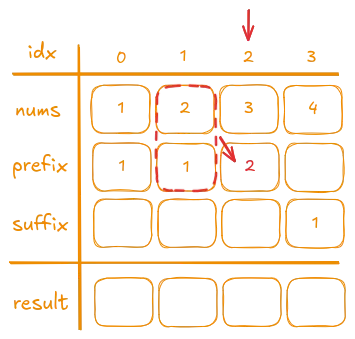
The third and the last iteration (at index 3):
- The previous number (
nums[2]) is3. - The product stored in
prefix[2]is2. - We multiply them:
3 * 2 = 6. - We then store
6inprefix[3].
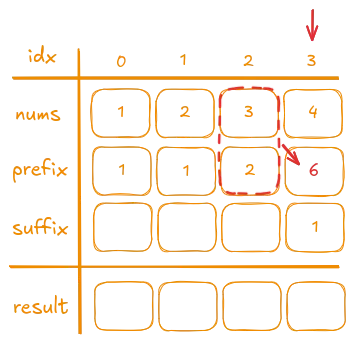
For example, the product of all numbers before nums[3] is stored in prefix[3]:
1 * 2 * 3 = 6.
Iteration on Suffix
The same logic is applied to calculate the suffix vector, but we iterate in reverse order. Since we already know that there are no numbers after the last element, the last element in the suffix vector is set to 1. We then start the iteration from the element before the last one.
For example, in this case, assume the iteration starts at index 2:
- The next number (
nums[i + 1]) is4. - The product stored in
suffix[i + 1]is1. - We multiply them:
4 * 1 = 4. - We then store
4insuffix[2].

In the following iteration, moving one step further in reverse order:
- Suppose we are now at index
1. - The next number (
nums[i + 1]) is the value stored at index2(which we calculated as4in the previous step). - The product stored in
suffix[i + 1](i.e.,suffix[2]) is4. - We multiply them:
value * 4. - For instance, if
nums[1]is3, then3 * 4 = 12is computed. - We then store
12insuffix[1].
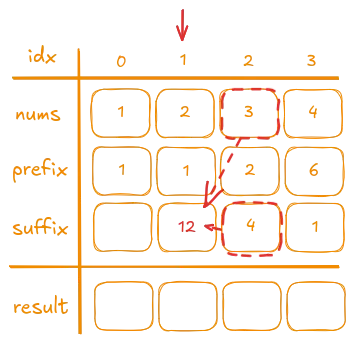
And the last one:
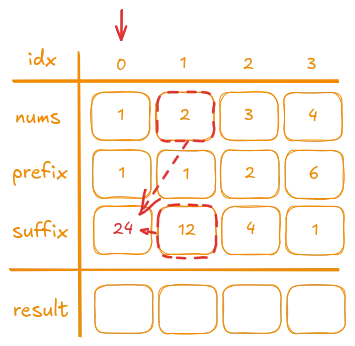
We can as well check if everything is correct:
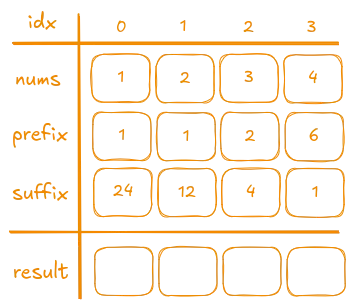
For example, let’s take nums[1] is 2. Before index 1, we only have the number 1, so the product is 1 and prefix[1] is 1. After index 1, there are two numbers, 3 and 4, whose product is 12. This value is stored in suffix[1]. Everything works as expected!
Calculating Result
Now, to compute the final result, we simply multiply the corresponding values from the prefix and suffix arrays at each index.

Implementation
pub fn product_except_self(nums: Vec<i32>) -> Vec<i32> { // Initialize with 1 to set the prefix as the first element // and the suffix as the last element. let mut prefix = vec![1; nums.len()]; let mut suffix = vec![1; nums.len()];
for i in 1..nums.len() { prefix[i] = prefix[i - 1] * nums[i - 1]; } for i in (0..nums.len() - 1).rev() { suffix[i] = suffix[i + 1] * nums[i + 1]; }
prefix .into_iter() .zip(suffix.into_iter()) .map(|(v1, v2)| v1 * v2) .collect()}- Time Complexity: O(n)
- Space Complexity: O(n)
Prefix and Suffix with no extra memory
TODO